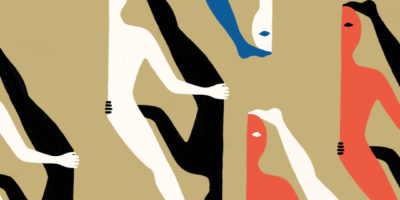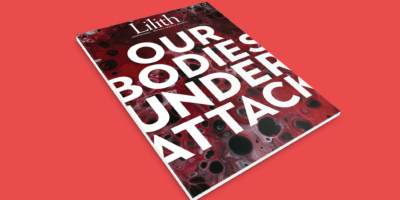
Hormones in Motion: How Estrogen Set Me Free
Hormone, n. (Greek) “setting in motion.”
“It is known that the angels are deemed ‘those who are standing [still]’ as are souls before they arrive in this world… Only after the souls descend to this world and are enclothed in bodies are they known as ‘those who walk.” atorah Vol. II, Bamidbar, Beha’alotcha)
As I write these lines, I’m holed in a cozy trailer, escaping unseasonably cold and clammy L.A. weather while fighting the effects of a particular nasty period.
Naturally, I found myself picking up my faithful iPad Pro and expressing my thoughts on hormones while dangerously low on hormones. Ironic, sure—but also immensely helpful. How better to feel the effects of hormones than when in full-fledged withdrawal from them?
My mind like a ship in motion, I wonder how the hormone binary came to be, evolutionarily speaking. I’m not an evolutionary biologist, but it likely goes something like this: most of us have a base amount of estrogen and testosterone in our bodies. Some hominids who were able to produce more testosterone displayed a marked advantage in survival and procreation—after all, it’s easy to see how an advantage in both muscle mass and sex drive will translate into more babies. And so they slowly developed rudimentary testes which escalated exponentially these other sex differences, all to the benefit of survival.
My body in motion: I’ll spare you the operative details but it’s enough to say that by way of artificial intervention I no longer have testes, rudimentary or otherwise. So when I say I’m out of hormones, I mean out of any hormones. Here’s an inventory of how I feel right now: it’s almost as if I have a full-body headache. I mean imagine a full-body orgasm? Same thing, except it’s a headache. In other words, it starts at the top of my head and courses through all of my organs and limbs down to my toes. My bones ache. My stomach is bloated. I’m dizzy and nauseated. I’m starving although I had a burger and fries and all the trimmings for lunch, yet I heave at the thought of eating more. I feel as though I’m about to break down sobbing any moment now. My skin is tingling and not in a good way. My alternating hot and cold flashes prohibit me from doing anything about it because the moment I turn the heat on I start sweating and vice versa. And did I mention the headache?
And my job is in motion, too. While I’m here on the backlot as a Jewish cultural consultant, I’m no longer visibly Jewish, but I am visibly trans. And so I find myself fielding at least as many questions about trans people as I do about Jewish culture. When I first arrived two weeks ago, a lot of those inquiries centered around my all-too-recent facial feminization surgery. Now that I’m on my period, people are curious about trans women’s periods (basically all the same symptoms, minus the bleeding). At this moment, however, my body has run out of hormones—before I could make it back home for a top-up.
My soul ever in motion, one of my favorite prayers from my observant youth was the Asher Yatzar, recited after evacuating one’s bowel or bladder. This prayer—in Hasidic and Mussar discourse—has outsized significance, for in it we express our profound appreciation for our anatomy as formed by God.
Underscoring the respective orifices and strictures in our varied internal organs, we praise God for creating humans with wisdom because God he had opened what should be closed, or vice versa, we would not be able to “stand before You for even one hour.”
Now, when I think of what single biological change, if any, would impact my very existence, it’s not a misplaced orifice. No, I find sex hormones a far more significant biological variable. The idea that such minor chemicals are responsible for so much of who we are is extraordinary. The replacement of my body’s testosterone with estrogen has changed me in ways that I never contemplated. Yes, I was always a woman with or without “feminine” hormones (as are all my trans sisters who, either by choice or lack of access, etc., will never utilize hormone replacement therapy), yet they are singularly responsible for aligning my emotional and corporal expression with that of my gender identity.
Hormonal motion and change is a rite of passage on the sea of change for most women (as well as many people of all genders), but I know what it is to live without estrogen—it’s to live unfeeling, to exist unmoving, to drift aimlessly at sea—and I can no longer do that. In fact, these last few years have taught me that I can do without most things we take for granted, but hormones are not one of them.
Fittingly, the Asher Yatzar blessing has since been replaced in my mind with another one that is far more significant to me—Shehecheyanu. Blessed are You O Divine One, regent of the universe, for You have given me life, sustained me, and brought me to this time.
In other words, thank you for setting all of me in motion.
Lili Rosen is an ex-Hasidic trans actor, writer and producer best known for her work on Netflix’s “Unorthodox” and her critically- acclaimed short film, “The Binding of Itzik.”



